USA closes out U17 Worlds with 3 golds, historic FS title
Sunday, July 31, 2022 - 15:54 By Vinay Siwach

ROME, Italy (July 31) -- James GREEN (USA) was part of the USA team which won the freestyle team title for the first time in 22 years at the 2017 World Championships. The two-time world medalist won a silver medal in that edition.
Five years later, Green got another chance to hold the team trophy, this time as the chief coach of the USA team at the U17 World Championships in Rome on Sunday.
USA won a historic first U17 freestyle world title in Rome with nine out of their 10 wrestlers winning medals including four golds. It finished with 190 points which was more than enough to exchange places with defending champions India which finished with 126 points.
Azerbaijan, a nation that won the European team title, finished third with 122 points.
USA became the fourth nation to win the U17 world freestyle title after Russia, Iran and India since the U17 Worlds were reinstated in 2011. Russia won the title every year until 2018 when Iran broke that streak.
Russia won again in 2019 before India became only the third country to win the title in 2021.

"It feels like it's straight out of a movie," he said. "It's like a reminiscent of 2017 when I was part of the world team that won the title for the USA after 22 years."
After finishing with a gold, three silver and a bronze medal on day six, the USA rocked again on the final day with three gold and a bronze to close out the tournament.
"I know how these guys are feeling," he said. "I am so excited to win this on my first trip and looking forward to more coaching."
Since 2011, the USA finished in the second spot five times in nine U17 Worlds with the latest being to India at the previous edition. But this year, all the USA wrestlers won their head-to-heads against India which ultimately proved to be the difference between who became the champions.
"The draw kind of worked in our favor," Green said. "We definitely had a gameplan not just for India but for everyone else including the Europeans as well. But I can tell you one thing that our wrestlers wanted to get a hand on Indian wrestlers because we lost to them last time."

Luke LILLEDAHL (USA) finished with a silver medal in 2021 after suffering a loss against Aman GULIA (IND) but there was no stopping Lilledahl this year as he upgraded to gold with a dominating 10-1 win over Mohammad Reza ASADI (IRI).
The 51kg final, pretty much controlled by Lilledahl, began with two exchanging stepout but then the USA wrestler switched levels after the break and scored takedowns whenever he found Asadi going for a half shot. He countered two of Asadi's attacks while he scored a takedown and added a leg lace in his 12-1 victory for the gold medal.
"Luke wrestlers at a hard pace," Green said. "He keeps a low head but is always moving and engaging. He takes the points as they come and doesn't rush into attacks."
Two other gold medalists for the USA on Sunday, Domenic MUNARETTO (USA) and Joseph SEALEY (USA), also impressed Green.
Munaretto won the 45kg gold medal by beating Bashir VERDIYEV (AZE), 2-0 in the final. Overall, the champion outscored his opponents 30-2 in the tournament.

At 71kg, Sealey dashed local hopes to see a home champion by decimating Raul CASO (ITA), 12-0, in the gold medal bout.
Sealey, like his all other bouts, was wrestling at a completely different level and pace which Caso had no answer to. When Caso tried to engage in underhooks, he would get tripped by Sealey and when he tried to score a takedown, Sealey would easily stop any such attempts.
His two inside trips and two takedowns were enough to help Sealey win the crown and get some praise from coach Green.
"Sealey was very impressive," he said. "He wrestles like a senior athlete and can wrestle someone from that level. He conceded the least points in the whole tournament."
Sealey wrestled five bouts to win the gold and in an impressive record, scored 55 points and conceded only one.
Drawing experience from the title-winning run in 2017, Green had communicated to his team to 'have fun' during the tournament.
"I just told them that you are capable of being world champs and future Olympic champions," he said. "But more importantly I told them to have fun at this tournament. Most of these guys are wrestling for the first time and they can be hard on themselves so I didn't want that. And once we all met, they had the team chemistry and it clicked right away."

The other gold medals of the night were shared between Iran and Kazakhstan.
At 60kg, Ebrahim ELAHI (IRI) defeated U17 Asian champion Bilol SHARIP UULU (KGZ), 5-4 to win the gold after trailing 3-1 at one point. Sharip Uulu scored the first points with a duck-under during the activity period against Elahi. It was initially awarded as four but Iran challenged the call and it was reversed to two points only.
But Elahi's constant moves towards Sharip Uulu's legs paid dividends as he leveled the score 3-3 and led on criteria. He then added a takedown against the tiring Kyrgyzstan wrestler to extend his lead to 5-3. He was warned for fleeing during the final 10 seconds which made the score 5-4 but did not change the result.
Elahi's gold was Iran's first of the tournament as it finished fifth in the team rankings.

Returning bronze medalist Kamil KURUGLIYEV (KAZ) went all the way this year and captured his maiden world title, a month after he had won the U17 Asian title.
Musza ARSUNKAEV (HUN) had no answers to Kurugliyev's style of wrestling, inspired by his former world bronze medalist father and cousin-brother, European champion Duaren KURUGLIEV (RWF).
After a 3-0 lead in the first period, Kurugliyev began the second with a huge double-leg for four and then added two takedowns to close out a statement win in Rome.
The World Championships season will now move to Sofia, Bulgaria with the U20 Worlds beginning August 15.
RESULTS
45kg
GOLD: Domenic MUNARETTO (USA) df. Bashir VERDIYEV (AZE), 2-0
BRONZE: Arman HARUTYUNYAN (ARM) df. Amirmohammad NAVAZI (IRI), via fall
BRONZE: Nikoloz BOTCHORISHVILI (GEO) df. Constantin RUSU (MDA), 5-4
51kg
GOLD: Luke LILLEDAHL (USA) df. Mohammad Reza ASADI (IRI), 10-1
BRONZE: Nurdanat AITANOV (KAZ) df. Ben TARIK (MAR), 1-1
BRONZE: Elman AGHAYEV (AZE) df. Baiaman KERIMBEKOV (KGZ), 4-1
60kg
GOLD: Ebrahim ELAHI (IRI) df. Bilol SHARIP UULU (KGZ), 5-4
BRONZE: Nikhil PILANAGOILA (IND) df. Agha GASIMOV (AZE), 5-2
BRONZE: Taiga OGINO (JPN) df. Alessandro NINI (ITA), 3-1
71kg
GOLD: Joseph SEALEY (USA) df. Raul CASO (ITA), 12-0
BRONZE: Razmik YEPREMYAN (ARM) df. Alisher ZHOLDASBAY (KAZ), 9-2
BRONZE: Aghanazar NOVRUZOV (AZE) df. NARENDER (IND), 3-1
92kg
GOLD: Kamil KURUGLIYEV (KAZ) df. Musza ARSUNKAEV (HUN), 11-0
BRONZE: Maxwell MCENELLY (USA) df. Sahil JAGLAN (IND), 2-1
BRONZE: Erfan ALIZADEH (IRI) df. Varuzhan HOVHANNISYAN (ARM), 11-0


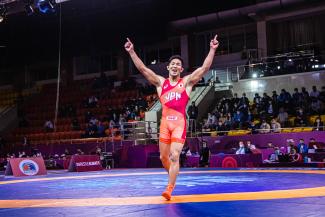
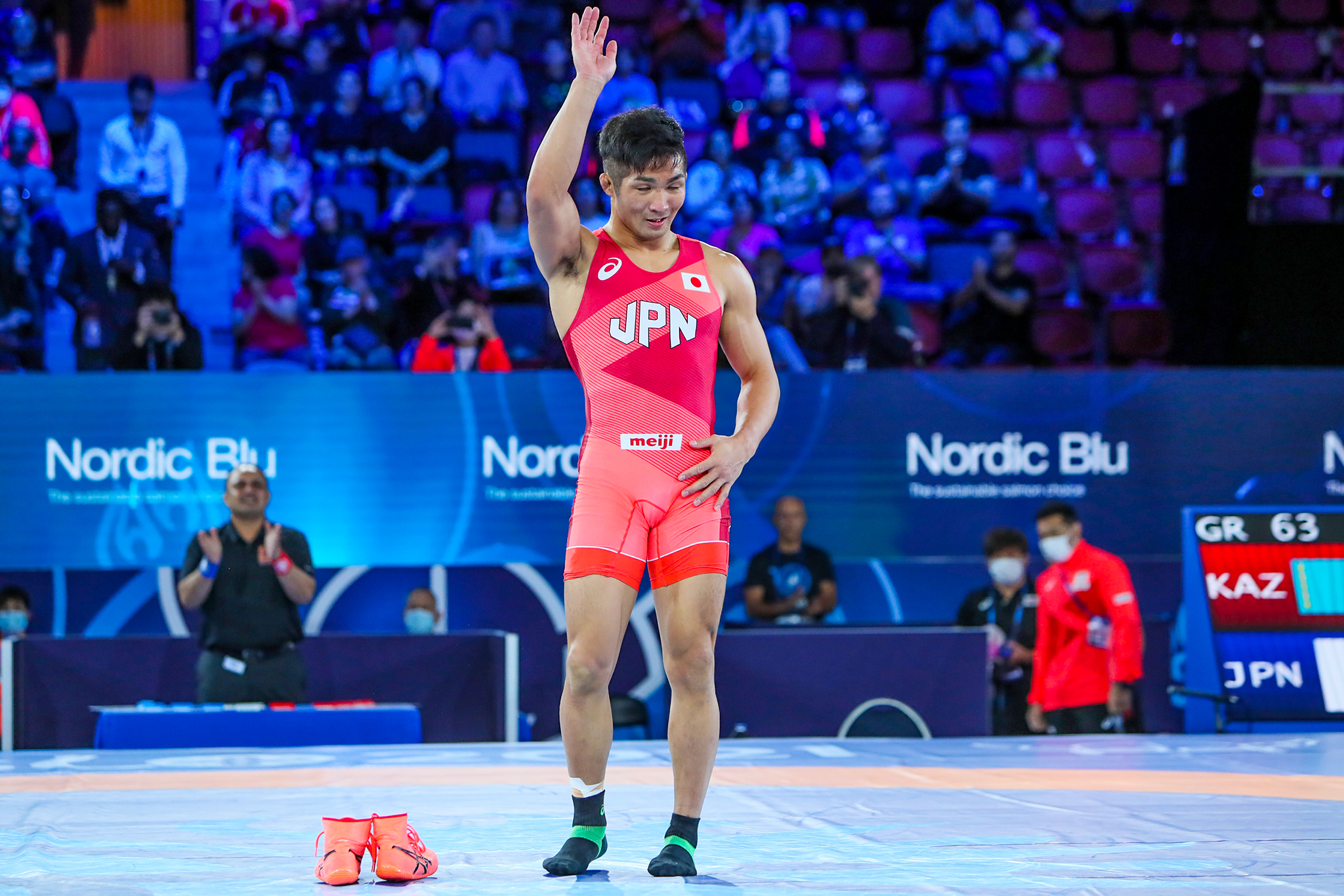 Tsuchika SHIMOYAMADA (AUS) had left his shoes on the mat during the 2021 World Championships to mark his retirement. (Photo: United World Wrestling / Martin Gabor)
Tsuchika SHIMOYAMADA (AUS) had left his shoes on the mat during the 2021 World Championships to mark his retirement. (Photo: United World Wrestling / Martin Gabor)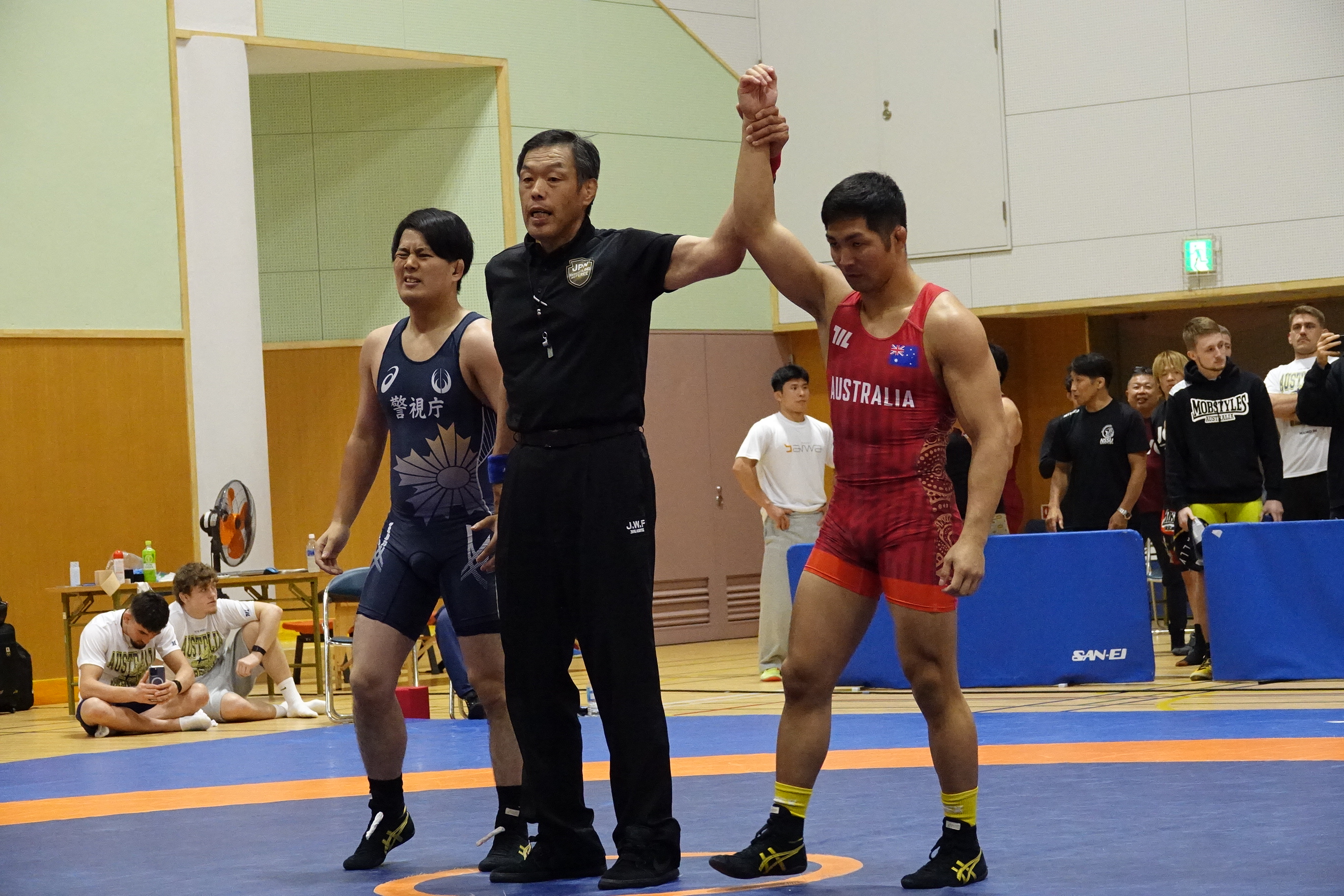 Tsuchika SHIMOYAMADA advances to the semifinals at the All-Japan Non-Student Championships in July with a 52-second win over Kokoro GOTO. (Photo: Koji Fuse / wrestling-spirits.jp)
Tsuchika SHIMOYAMADA advances to the semifinals at the All-Japan Non-Student Championships in July with a 52-second win over Kokoro GOTO. (Photo: Koji Fuse / wrestling-spirits.jp)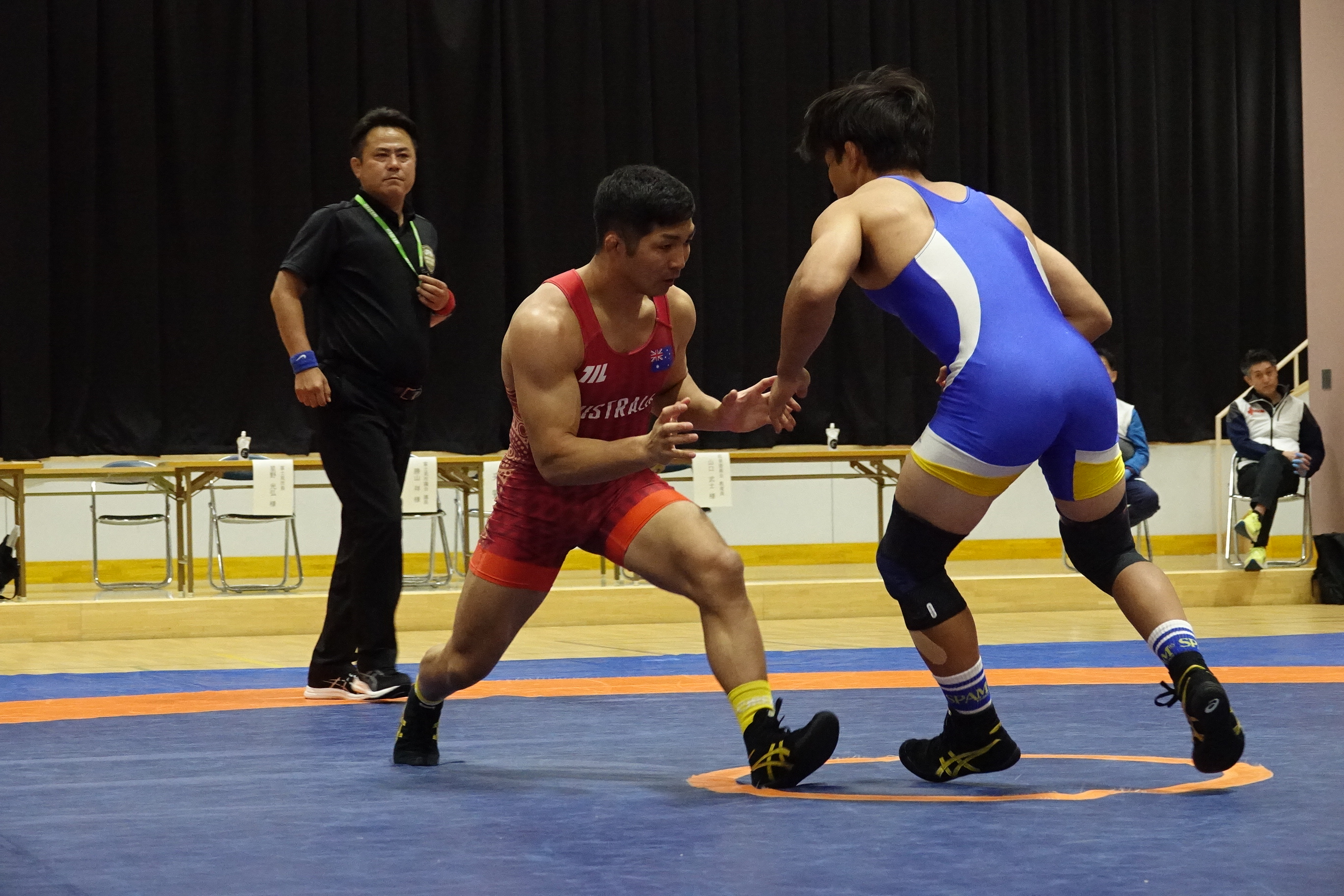 Tsuchika SHIMOYAMA faces Keitaro ONO in his opening match at the All-Japan Non-Student Championships in July. (Photo: Koji Fuse / wrestling-spirits.jp)
Tsuchika SHIMOYAMA faces Keitaro ONO in his opening match at the All-Japan Non-Student Championships in July. (Photo: Koji Fuse / wrestling-spirits.jp)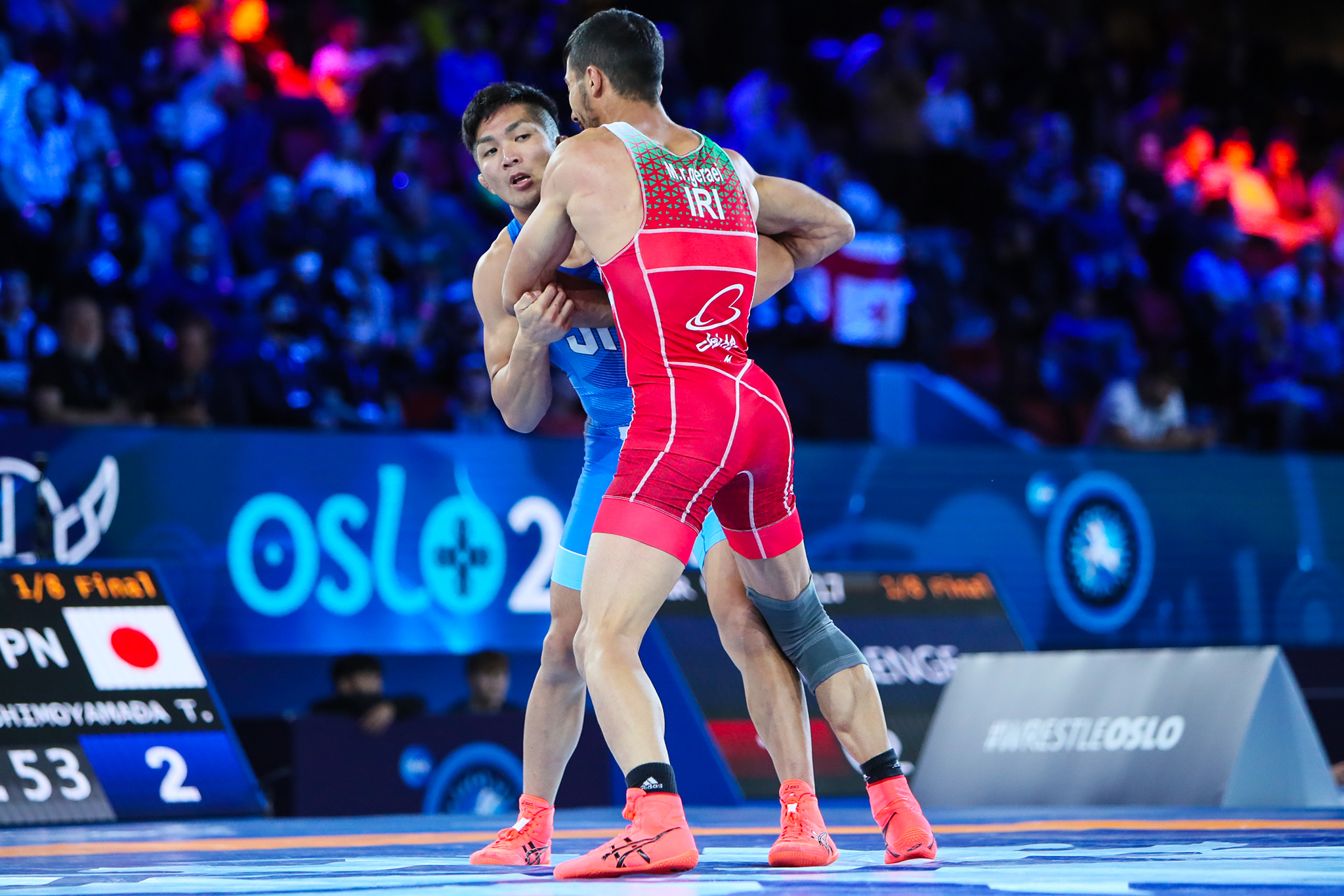 Tsuchika SHIMOYAMADA (AUS) was dominating Mohammadreza GERAEI (IRI) in their match at the 2021 World Championships before being pinned. (Photo: United World Wrestling / Martin Gabor)
Tsuchika SHIMOYAMADA (AUS) was dominating Mohammadreza GERAEI (IRI) in their match at the 2021 World Championships before being pinned. (Photo: United World Wrestling / Martin Gabor)
Share your thoughts.
Comments